
On Tuesday, about 30 organizations that make up the Digital Equity Coalition attended the press conference. Photo by Brenda Fernanda Verano.
Eliminating digital redlining in Los Angeles is the north star of a motion introduced in the L.A. City Council on December 12. The motion emerged from the Digital Equity Coalition, made up of 70 organizations in Los Angeles, representing and working alongside community members and people directly affected by inequitable broadband connectivity in cities across the county.
Before introducing the motion in Tuesday’s city council meeting, the Digital Equity Coalition held a press conference on the steps of City Hall to commemorate the groundbreaking motion. If passed, the bill would pave the way for new and effective action to identify, fix, and prevent discrimination in access to critical broadband services, such as internet speed, wifi connectivity, hotspots, and more. The motion, introduced and authored by Councilman Marqueece Harris-Dawson, will also make L.A. a model for the rest of the country as the first city to take decisive action to ensure equitable access to fast, reliable, and affordable internet.
“What the bill looks at today is making sure that internet access is available to every Angeleno, at the same price because right now, we have a situation where you can get high-speed internet in wealthier neighborhoods for less money than you get if you live in a poor neighborhood,” Harris-Dawson told CALÓ NEWS.
What Harris-Dawson is referring to are the various studies and reports that inspired the creation of the bill and the Digital Equity Coalition, one of them being the “Slower and More Expensive: Internet Pricing Report" by the California Community Foundation (CCF) .
The 2022 report revealed that residents of higher-poverty communities are routinely offered more expensive, slower services than those in wealthier communities. The report, which was a community-led and community-driven effort, was intended to shine a light on systematic underinvestment by Internet service providers (ISPs) in low-income communities and communities of color, which is the biggest driver of digital inequity.
“The findings of this report are sobering, raising significant red flags about the higher prices many poorer communities are being charged for the same or inferior service, and the implications of those pricing disparities on the effectiveness of current interventions to close the digital divide,” stated the report.
Shayna Englin, director of the Digital Equity Initiative at CCF, said at Tuesday’s press conference that the report “documented really disturbing patterns.”
Some of the report’s key findings include published pricing for internet service provider Charter Spectrum, which shows a clear and consistent pattern of the provider reserving its best offers (high speed at low cost) for the wealthiest neighborhoods in LA County. For example, the average price of “Internet,” the brand name for Charter Spectrum’s service tier, offering up to 300Mbps download speeds (advertised at 133 of the 165 addresses in the report), is $9 per month higher in high-poverty neighborhoods than in wealthy neighborhoods: $50 per month versus $41 per month.
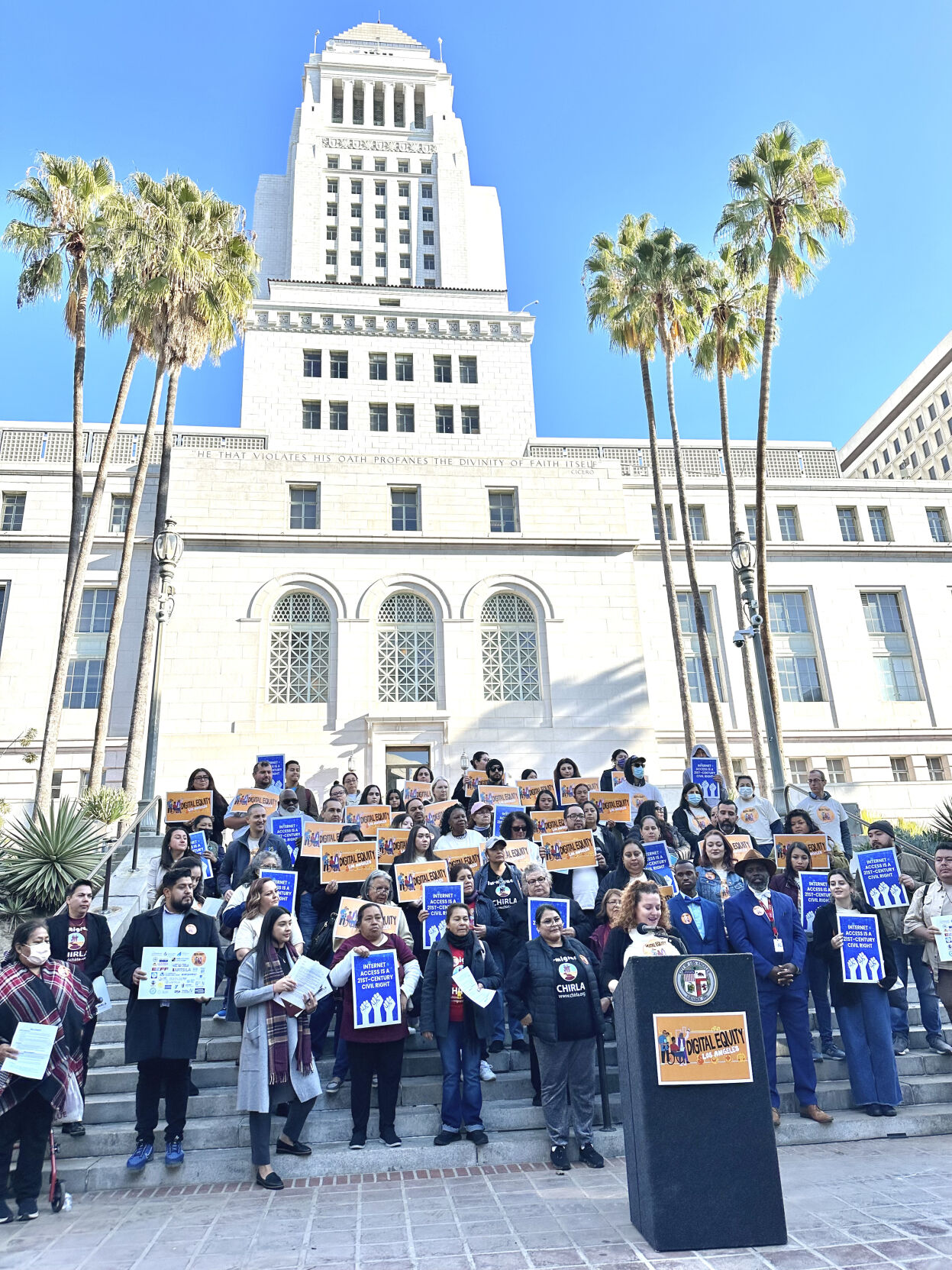
Englin presented in Tuesday's City Council meeting. Photo by Brenda Verano.
The report also showed that people who live in higher-poverty neighborhoods like South LA, Watts, or East LA are not only routinely offered slower service at higher prices but are also offered contracts with worse terms and conditions. For example, Charter Spectrum’s promotional offers, guaranteeing a period before prices will increase, are for two years in wealthy communities, but just one year in high-poverty communities. Charter Spectrum’s low-cost plans are not consistently advertised to households in high-poverty neighborhoods.
Englin also said CCF is not the only organization to have studied and found the same discriminatory patterns in low-income communities in L.A. “After CFF published our report, we called for more investigation and action, and [this] spring, the University of California at Santa Barbara. published a study,” she said. “At scale, they looked at 35,000 locations across the city of Los Angeles and found exactly the same thing that we did: that whiter wealthier neighborhoods routinely have access to better pricing for internet than communities of color and low-income communities.”
Eunice Hernandez is one of the additional council members supporting and co-signing this bill and was present at Tuesday’s press conference. She said access to the internet is no longer a commodity; it is essential.
“As we celebrate this important step forward in closing the digital divide here in L.A., I'm here to remind us that COVID-19 showed us what the digital divide actually looked like, where some families had internet, some families didn’t, and some kids had to go to parking lots,” she said. “The digital transformation has reshaped the way we work, the way we learn, and the way we interact with our healthcare providers. Without digital access, our communities are artificially isolated and unable to fully participate in these economic, educational and social opportunities.”
However, racial gaps in broadband internet access is still a recurring issue, even after the pandemic, especially in Latino households.
Ursula Hidalgo, 47, has been living in the United States since 2007 after fleeing Guatemala with her family because of violence. She is a mother who tries to support her kids in school, even when she does not speak or understand English, but her inconsistent internet connection and unfair prices make it hard. “Many [immigrants] overpay for internet service and many times the quality is not the best,” Hidalgo said. “In my house, when my children are studying, it always breaks down.”
Hidalgo, who is a member of CHIRLA, believes many immigrant, Latino, and Spanish-speaking households get the worst end of the deal when it comes to internet services. “As immigrants, day by day, we contribute to this country; our children go to school, we work, we pay thousands of dollars in taxes. We are part of the 3.82 million people who reside in this city, but when it comes to services, programs for the community, many times they do not include us, undocumented immigrants,” she said. “It is time for the policy to change and for the politics in our city to change, and all this begins with recognizing that we are discriminated against.”
This motion will help ensure that in L.A., everyone has equal access to affordable, reliable broadband service that addresses any structural barriers, regardless of the neighborhoods people live in.
For Councilmember Nithya Raman, there is one clear image that drives her support and dedication to the motion presented on Tuesday, and that is the viral images of children huddled outside fast food restaurants like McDonald’s to use the facilities’ WiFi. “To me, that image is the image I hold with me as I stand with Councilmember Harris-Dawson today in driving this work forward. That is an image that we will make part of this city’s history, but not part of our city’s future,” Raman said. “Your neighborhood or your zip code should not determine the cost or quality of your access to basic broadband internet service.”
In addition to making sure everyone in L.A. receives fair and equitable internet access plans, Harris-Dawson told CALÓ NEWS, that he wants to create hubs where there is free WiFi, such as main streets, near libraries, parks, and schools. “In a place that is the digital capital of the world, the least we can do is make sure every Angeleno has equitable access to the information superhighway,” he said.
Ray Lopez-Chang, Director of Advocacy and Planning at GPSN part of the Digital Equity Coalition, said it can take as little as 3 months and as long as 12 months for the fruits and wins of this motion to be seen by the communities of L.A. The motion must go through the committee process before it makes it to the desk of the mayor, Karen Bass.
“In the way that we have seen electricity, water and gas become utilities in the city of LA and across the country, we are now at a time where we are also ready for the internet to be treated as a human and civil right necessity,” Lopez- Chang said.

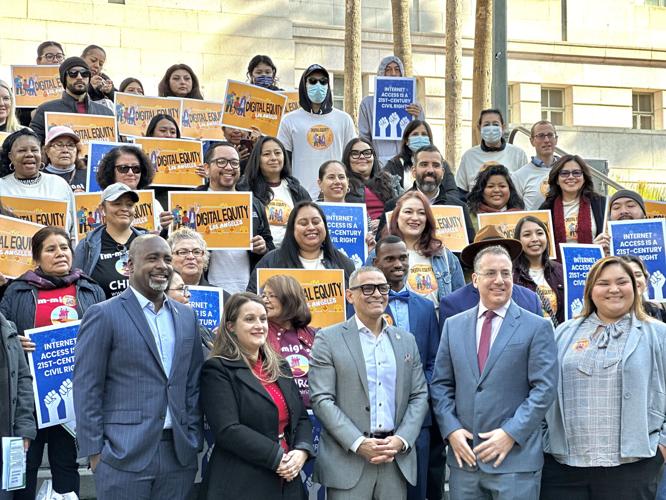
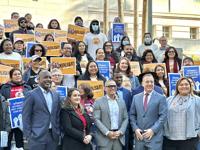
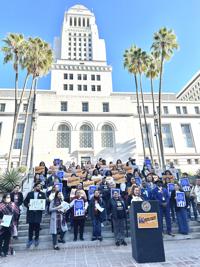

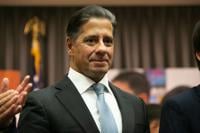

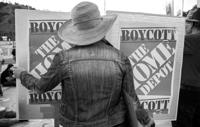

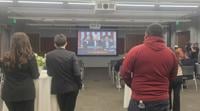

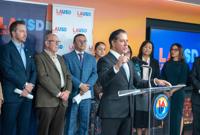
(0) comments
Welcome to the discussion.
Log In
Keep it Clean. Please avoid obscene, vulgar, lewd, racist or sexually-oriented language.
PLEASE TURN OFF YOUR CAPS LOCK.
Don't Threaten. Threats of harming another person will not be tolerated.
Be Truthful. Don't knowingly lie about anyone or anything.
Be Nice. No racism, sexism or any sort of -ism that is degrading to another person.
Be Proactive. Use the 'Report' link on each comment to let us know of abusive posts.
Share with Us. We'd love to hear eyewitness accounts, the history behind an article.